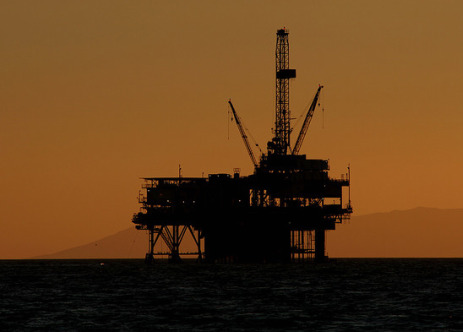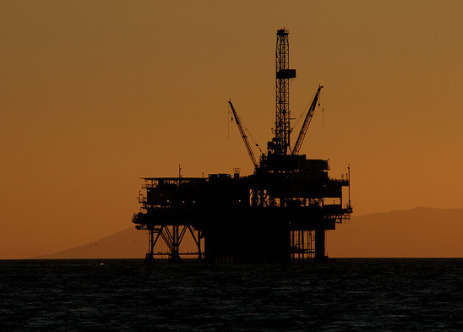 Photo: arbyreed via FlickrWe finally got a look at what Senate Majority Leader Harry Reid (D-Nev.) considers climate and energy legislation. Don’t cheer all at once.
Photo: arbyreed via FlickrWe finally got a look at what Senate Majority Leader Harry Reid (D-Nev.) considers climate and energy legislation. Don’t cheer all at once.
What we have is a spill bill with trinkets [PDF] — some money for Home Star, which would provide rebates to people who do energy-efficiency retrofits on their homes; some money to help convert commercial trucks to natural gas; some money for the Land and Water Conservation Fund; and some money to start building an infrastructure to support electric cars — a project pushed by the Electrification Coalition, a group of executives from companies like PG&E and Nissan. (Coincidentally, it just so happens that Nissan has a new electric car about to hit the market.)
The rest of the Senate bill cracks down on offshore drilling. A House bill [PDF], also trotted out yesterday, deals exclusively with tightening regulation of oil and gas drillers. Kate Sheppard of Mother Jones provides a good rundown of both bills.
The pain is almost pleasure: While all of the above might sound pretty unobjectionable, au contraire. Republicans are moaning about some of the measures aimed at offshore drillers, particularly one that eliminates the cap on a company’s liability for a spill, and another that would raise the current oil production tax from 8 cents per barrel to as much as 49 cents per barrel. The House bill also includes a provision that would forbid any company with a history of safety violations from bidding on new leases. (That’s a big uh-oh for BP.)
Aside from complaining that they won’t have time to debate the bills (like this whole energy issue just came up last week), some Republicans are saying they’re being set up, since the bills include changes they can’t possibly support. And that will make it easier to portray them as tools of Big Oil. As one Democratic strategist told Politico’s Coral Davenport, “Republicans have found themselves on the defensive on that issue, and they are sitting on piles of big oil contributions. Absolutely, this is something we will be playing up before Election Day.”
Dr. Squealgood: The American Petroleum Institute (API) immediately went into High Whine. (Bet you didn’t see that coming.) It issued a statement warning that the bills would “cut domestic production, kill American jobs, slow economic growth, and cost billions in federal oil and natural gas revenues.” (It stopped short of claiming it would mean the end of the world as we know it.) Later, API CEO Jack Gerard took his shots, badmouthing a measure in the House bill that would raise the standards for blowout preventers, the last-stop devices designed to keep wells from rupturing. It was premature, he kvetched, since no one has officially determined the cause of the Deepwater Horizon explosion. He said it was “like going into surgery without a diagnosis.” It was, he concluded, “the ultimate in malpractice.”
Slime after slime: Meanwhile, back at the spill, a squad of federal investigators is gathering in New Orleans to start a criminal probe of Deepwater Horizon’s Big Three — BP, Transocean, which owned the rig, and Halliburton, which poured cement for the well, reports Jerry Markon in The Washington Post. The federal agency formerly known as the Minerals Management Service could also take a hit.
One emerging line of inquiry, sources said, is whether inspectors for the Minerals Management Service, the federal agency charged with regulating the oil industry — which is itself investigating the disaster — went easy on the companies in exchange for money or other inducements. A series of federal audits has documented the MMS’s close relationship with the industry.
Masters of perception: There’s no question that the BP spill hasn’t been good for Obama. But you can’t say the same thing for Gulf Coast governors. Jeanne Cummings, writing in Politico, reports how Florida Gov. Charlie Crist (R), Mississippi Gov. Haley Barbour (R), and Louisiana Gov. Bobby Jindal (R) have all been able to spin the oil slick into political fortune. Their photo ops on beaches and rants against the feds have boosted their popularity — Jindal’s approval rating is now up to 74 percent. Is it sour grapes to bring up how his pet project to build sand berms has been condemned by almost two dozen Gulf Coast scientists? Or that Barbour, as head of the Republican Governors Association, was able to raise $2 million from oil and gas interests last quarter?
How BP goes green: It was tough enough to swallow that BP Bad Boy Tony Hayward will get a pension of almost $1 million a year. But now it looks like BP, due to the huge cost of dealing with the spill, will be able to write off almost $10 billion in U.S. taxes — or roughly half the amount it pledged to victims of the spill.
They know slick.



